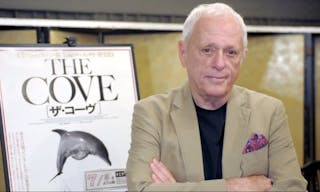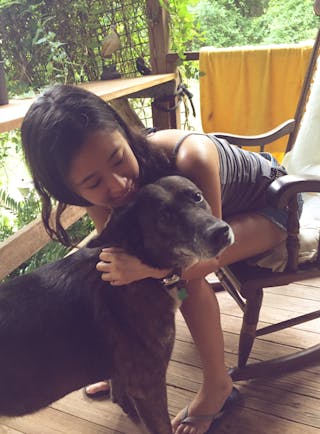What you need to know
Awareness of dolphin capturing and trafficking in Taiji, Japan, and around the world has been raised since the release of the Academy Award-winning documentary 'The Cove.' But have things really been improving for dolphin protection? Activist Richard O'Barry discusses the matter with The News Lens International.
The annual Taiji dolphin hunt in Japan has been going on since 1969, and with the release of the Academy Award-winning documentary, "The Cove" (2009), awareness of the issue has been raised around the world in recent years.
Richard "Ric" O’Barry has been working with dolphins in the wild and in captivity for more than 50 years. In the first 10 years, O’Barry captured and trained dolphins, but for the last 46 years he has been doing the exact opposite: un-training dolphins and getting them back into the sea where they belong. The 76-year-old activist was also featured in "The Cove," exposing the dolphin drive hunt in Taiji. O’Barry was arrested and detained in Japan last year, and was ordered to leave the country this January.
After being barred from entering Japan, O’Barry is currently traveling around Europe advocating for dolphin protection and looking to build a dolphin sanctuary in Greece. On June 27, The News Lens International had a conversation with the activist (in Denmark at the time of the interview) to learn more about his work and plans after being denied entry to Japan.
The News Lens International (TNLI): What have you been up to in Denmark these days?
Richard O’Barry: Well, actually I’m very interested creating a sanctuary for dolphins and we are looking at places in Europe to do that, so I’m based here [Denmark], and I’m looking for warm water with a lagoon so we can create an alternative for a dolphin area.
TNLI: You have been an activist for dolphin protection for over 45 years. Have you seen an improvement in dolphin protection?
R.O.: Oh my God, yes. People who are just joining this cause as a result of seeing "The Cove" or "Blackfish" (2013), may not see a lot of improvement, but from my perspective I’m seeing a lot of change for the common good.
When I first started speaking out against the captivity of dolphins and other whales I was alone. People thought I was crazy. There was no such thing as PETA (People for the Ethical Treatment of Animals), Sea Shepherd, Greenpeace, and a lot of the organizations that now are also working on this issue. So it was very difficult back in those days to even do an interview like this.
Before "The Cove" came out, when I’m doing an interview with a journalist I would have to define the problem because the journalist and the rest of the world did not see the dolphin captivity issue as a real issue. What’s the problem? A few dolphins in captivity, they’re smiling, they seem to be happy, the music is playing, I’m here with my family, and the water is crystal clear and blue. What’s the problem? So I had to define the problem. I spent most of the interviews trying to convince the journalists there was something wrong with capturing dolphins and displaying them.
Because of "The Cove" I don't have to do that anymore. The films also educated the animal welfare industry. Most of the groups were not involved in this issue, but it’s a mainstream issue today.
So I have seen enormous change. The movie was a game-changer. These three things, "Blood Dolphin" (three-part mini-series from Animal Planet produced by O’Barry’s son, Lincoln O’Barry, in 2010), "The Cove," and "Blackfish" have really opened people’s eyes to this issue.
TNLI: So before these two films and one TV series were produced, you were practically working alone?
R.O.: Pretty much. It took 20 years, from 1970, just to make it an issue. But now a lot of change is happening and I’m pretty optimistic.
TNLI: In these first 20 years when you were working alone, how did you try to make your voice heard?
R.O.: Primarily by interviews. I do every interview; whether I’m talking to one person or five million people. It’s being in the game and showing up. It’s all about showing up. Showing up in Japan, in the Faroe Islands, in the Solomon Islands, all over Europe where dolphins are being abused and trafficked. When you show up, the media shows up, and you’re able to do these interviews. All of this serves to educate the public that is in the dark.
TNLI: Can you tell us about your work in Taiji?
R.O.: Taiji is all about the dolphin captivity issue. The capture of the dolphins in The Cove in Taiji is the economic underpinning of the slaughter. If it weren’t for those captures, the slaughter for the meat would have gone out of business years ago. That’s not making any money for them. They are losing money there. They are making all the money capturing dolphins and selling them to China, Korea, Russia, Turkey, Dubai and so on. That’s what keeps the whole thing going.
TNLI: But you have seen a gradual decrease in people purchasing dolphins from Taiji in the past few years, right?
R.O.: No. I actually see it going up. I see the consumption of meat going down as the Japanese consumer learns that it is contaminated with mercury. The Japanese people are more concerned about clean, healthy food than we are in the West. If they had any idea that the dolphin meat is actually contaminated with toxic substances they would not buy it. And that’s what’s happening. They aren’t buying it so much.
It’s really the capture of dolphins with the biggest customer of dolphins being Japan itself. Japan is the size of California, and has 127 million people and 52 dolphinariums. Most of these facilities in Japan are sub-standard. They have very small tanks and a very high mortality rate. The dolphins die and they simply get more from Taiji. These are disposable dolphins for their disposable society.
So Japan is the biggest customer. They keep the dolphin drive going by purchasing dolphins from the fishermen and rewarding them for their bad behavior. The second biggest customer is China. There are dolphinariums opening all over China, and Taiji is ground zero for all these captures and trafficking.
TNLI: How has the decrease of dolphin meat consumption and increase of dolphin purchasing changed the way you have been advocated for dolphin protection in the area?
R.O.: I have been going to Taiji since 2003. Multiple times a year for the last 14 years. We’re usually there September 1 [the start of the Taiji dolphin drive hunt] for the entire six months [the Taiji dolphin drive usually runs until the following March]. This year I won’t be there because last September when I tried to get into the country, I was denied access. I was arrested and put in jail.
Now I have filed a lawsuit against the Japanese government for false arrest and the first hearing will be in July. So I'm hoping I can get back into Japan because I need to be in Taiji to keep the pressure on. We’re going to keep the pressure on. Even though I’m not allowed in the country right now, I think hundreds of people will be there to replace me.
TNLI: At this point what would you say the biggest difficulty is for dolphin protection in Taiji?
R.O.: The biggest problem is the criminal government. Japan is a criminal government. They just do whatever they want to do and ignore the rest of the world. The government knows the rest of the world is against this [dolphin capturing]. That’s the biggest stumbling block. The right-wing government of [Shinzo] Abe.
TNLI: You mentioned earlier on the media has been a great help in your work. Has the Japanese media helped you out in any way?
R.O.: I have talked to hundreds of Japanese journalists. There are at least 50 of them there every September 1, but you have to understand that the Japanese media is controlled by the government. So you might get a sympathetic reporter who totally gets it and writes a good story, but the editor is not going to allow that story to get out there. They spin the story to please the government.
So you can’t count on the Japanese media. You have to count on the foreign correspondents club and all the international journalists to get the story out. And they do. They do a pretty good job. But there are still 127 million people in Japan who don’t even know anything this issue because the government doesn’t want them to know. This is not a democracy by any stretch of the imagination.
TNLI: To my understanding, Taiwan doesn’t have an issue of dolphin hunting, but it does have problems of shark finning. Do you have any suggestions on how activists in Taiwan can tackle this issue?
R.O.: They probably know better than I do. But I go to these places to lend my support. That’s a lot of what Dolphin Project [a project launched by O’Barry] does is to lend our support to activists who can’t get the media attention they deserve. And so I show up and the media shows up. I’m doing that constantly here in Europe. I’m able to use my celebrity to bring attention to this injustice.
TNLI: So it has been you working with the media to raise awareness about this issue.
R.O.: Yeah. Look, it’s all about supply and demand like any other product. A dolphin show is a product. If you can educate the consumers in hope they will stop buying tickets you have a chance of winning.
That’s what’s happening at Sea World. Sea World is going out of business because people stopped buying tickets when they saw "Blackfish." "Blackfish" was shown on national and international television and millions of people saw it over and over again. People became educated and they stopped buying tickets. The same is true in Finland, with a dolphinarium closing down recently.
That’s the solution. What we can do is to educate the consumers so they will stop buying tickets.
TNLI: You mentioned earlier that you are pretty optimistic for dolphin protection in future. Where do you see yourself five years from now and what are your hopes for dolphin protection then?
R.O.: In five years I will be 81 years old. I expect to be alive and well and living in the dolphin sanctuary that we are in the process of creating in Greece. Yes, old activists need sanctuary too, just like the dolphins. The annual dolphin slaughter in Taiji will be over by then. There will finally be peace in the bloody cove. I really do want this dolphin slaughter in Taiji end in my lifetime. And life goes on.
O'Barry encourages people to take a pledge on his website, Dolphin Project, to stop buying tickets to dolphin shows.
First Editor: J. Michael Cole
Second Editor: Edward White



